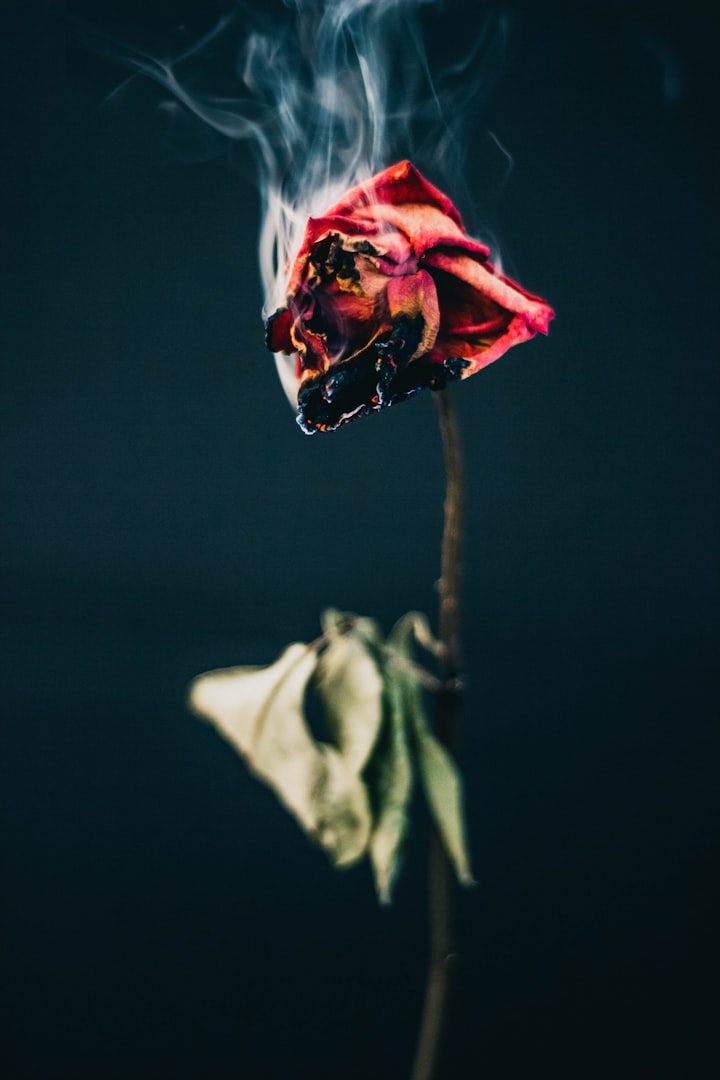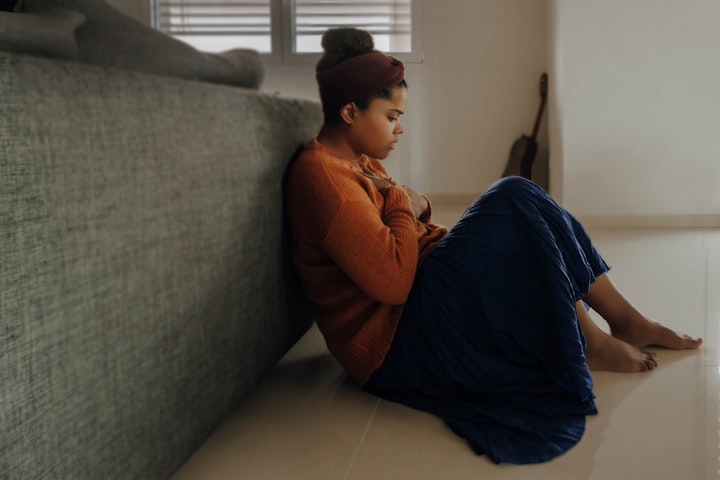The Reality of Sickness
Devastation & Theft

I was 14 years old when my body betrayed me. I was just a kid.
I remember it acutely. After being the subject of ruthless middle school bullying-and freedom from an unflattering dress code-I was ready to descend upon the world as a new me.
One day, I was a wide-eyed high school freshman, looking forward to the chance to start over. Overnight, I was wrung out and lifeless, scraping enough energy together to survive the days.
Before freshman year ended, I was sitting in the hallway floor during class, sobbing, calling my parents to come pick me up.
I was sick-with what, none of us knew-and I had begged a merciful teacher to let me call my parents to leave school.
By the time my father arrived to pick me up, I was a sweaty and disheveled mess with barely enough energy to carry my backpack.
I must have truly looked how I felt, for even my careless father took notice and concern. His brows slanted and he said "wow, you really look like you don't feel well."
It all went downhill from there.
The cause is still unknown, to me and my many doctors.
Some attribute it to my abusive home life-the mental torture had taken it's toll on me and, much like the ladies of an Austen novel, my body gave out in response. The PTSD of my home life was simply too much to bear.
Others, to the anxiety that crept in, slowly suffocating me without any physical visibility. The worry eroded my self-confidence, my personality, me away.
Many cited the science of the gut-brain connection and how stress, especially long term, could damage one's body.
One doctor discovered I had contracted mono and developed a recurrent condition that essentially flares up during periods of stress-my whole life was a period of stress and apparently the illness knew that too.
That was just one corner of a 1000 piece puzzle.

Either way, I ended up trapped in this terrible, self-fulfilling cycle. My body broke my brain, my brain broke my body. Over and over again until there is very little of me left at all.
I lost many friends. I cannot blame them; no one prefers the company of a semi-recluse. More over, no one in their teens and 20s cares for the company of someone who cannot drink or eat or go out.
Some friendships fizzled away. Others ended with a blunt blow-leaving gaping wounds of betrayal behind.
Nonetheless, my social activity was limited to family members I lived with and watching others live through the screen on my phone.
If you've lived like this, you know how dehumanizing it is. If you haven't, be grateful.
With determination, I barely managed the energy and health to go to college, a pursuit I was determined to see through.
I nearly dropped out three times due to my health.
I spent countless hours in tears over wasting "the best years of my life." I missed parties, couldn't live on campus, barely made any friends. It took all of my energy-my willpower-to attend, anything beyond was too much.
But if there was one thing I was good at, it was school. Thankfully, my mind could still function well enough for that. I have always loved learning; this love fueled me and kept me going.
However, it became increasingly more difficult as the brain fog took over-a cruel side effects of illness people rarely discuss.
I forgot names and conversations and agreements. My schoolwork became harder than ever as I struggled to remember basic things-things that I once would've remembered after a passing mention.
Despite the tears, pain, weakness, and overtaxing burden, I did it.
Relying on my close family, I hobbled across the finish line on an unbearably hot day in May. I earned my degree.

In many ways, it was a victory. I accomplished something no one in my family had before. I achieved something in spite of my illness -something it couldn't take away.
In others, it was like running out of road in a moving car. Once I finished school, I collapsed. I was worn to the bone. I was deeply ill. I was underweight, constantly sick, always tired, frequently confused and forgetful.
I say was as if I were discussing a fleeting moment.
But it has sunk its claws deep into my skin, taking up almost permanent residence there. I still am all of these things. And as the days pass by, I see no end in sight.
By now, my coveted degree is collecting dust, turned face down in the back corner of my closet. A place where I don't have to see the achievement I once so proudly hung on my walls.

Rather than a badge of honor, it is a reminder of all I have failed to become since. It is a reminder of broken dreams of a very broken woman. For years, I tried to hide this.
I tried to hide how broken I truly was, physically and mentally. I don't know why, I guess it was just the way of life I was accustomed to.
We hide anything that is stained with shame. We hid my father's abuse and alcoholism. And in this world, a broken body or mind-especially with no traceable reason as to why-is seen as very shameful.
So, of course, I would hide my weaknesses-mental and physical-in order to appear normal and strong.
I wanted to be normal so badly. I nearly convinced myself that if I faked it well enough it would be true.
But as the years go by, I find myself too tired to hide, too weak to cover up. I was forced to quit a job I loved, something I was passionate enough to base a career on, because of my frailties.
Because I loved it so much, I hid how tiring and exerting it truly was. I hid how much pain I was in with my coworkers and superiors. I would come home exhausted and in pain after my shifts.
But, oh, how I longed to be normal.
I used to dream of what life would be like once I was better. But, as birthdays and milestones pass, those dreams have died and been buried. Their graves are so old the grass has regrown over them.
"Once I am better" quickly turned into "if I get better." A sentiment that is fading itself. If seems too good of an estimation. I feel like a person planning for the end before it has arrived.
Illness stole my youth, and the invincibility that goes with it. It stole my ability to be carefree-to be free in general. It strangled the life out of me. It stole my will to live and, with a swift kick to the face, threatened me to stay silent.
The world doesn't understand me, or my illness, any better than I do. It's awkward and uncomfortable. People don't know what to say.

It's much easier for them to ignore it.
Since no one could figure out what was wrong, many came to the conclusion that there was nothing wrong. My mother was the only one who refused to look past it. Unfortunately, there was little she could do other than be a shoulder to cry on.
So much of my life, my pain, has been grounded in silence.
Yet, as I peel back the layers, it opens up a space for me to speak. Years of trauma and illness and pain covered my mouth like layers of duct tape. I was (and honestly, still am) so scared.
Scared of my body, of my health, of rejection, of failure-of everything.
But I'm no longer going quietly.

So many people out there are just like me: suffering from physical and mental issues that are difficult to pinpoint and, therefore, dismissed. This is especially true when it comes to women (you can read my article on that here).
It's a terrible thing to have to live with an illness that robs of your life but leaves you breathing. I'm sure many people would (and will) think I should be grateful that I'm still alive. And to an extent, they're right- and I am. But sometimes mercy is no longer suffering; and in the long, dark nights of illness, that line can be difficult to see.
So why do I write this? Because my experience has been so isolating, so lonely. And if just one person out there can read this and relate to it, then it's done its job.
This post doesn't have a happy ending where Im all better or an easy solution to a problem. That would probably make it inspirational and easy to digest. Trust me, I wish I could offer you that. But sometimes, the best, most honest writing comes from when we're being raw, vulnerable, and real. This is my honest experience. This is my reality.
—
If you loved what you read, would you be able to buy me a cup of coffee? It's okay if you can't right now. I still appreciate your support in reading.
Thanks for being a part of the journey 💗
About the Creator
Ashley Tripp
I’m a freelance writer & artist. I create pieces about the things that move me with the hopes that they move my readers too. My work has been featured in multiple publications. Check out my website for more at https://msha.ke/ashleytripp






Comments
There are no comments for this story
Be the first to respond and start the conversation.